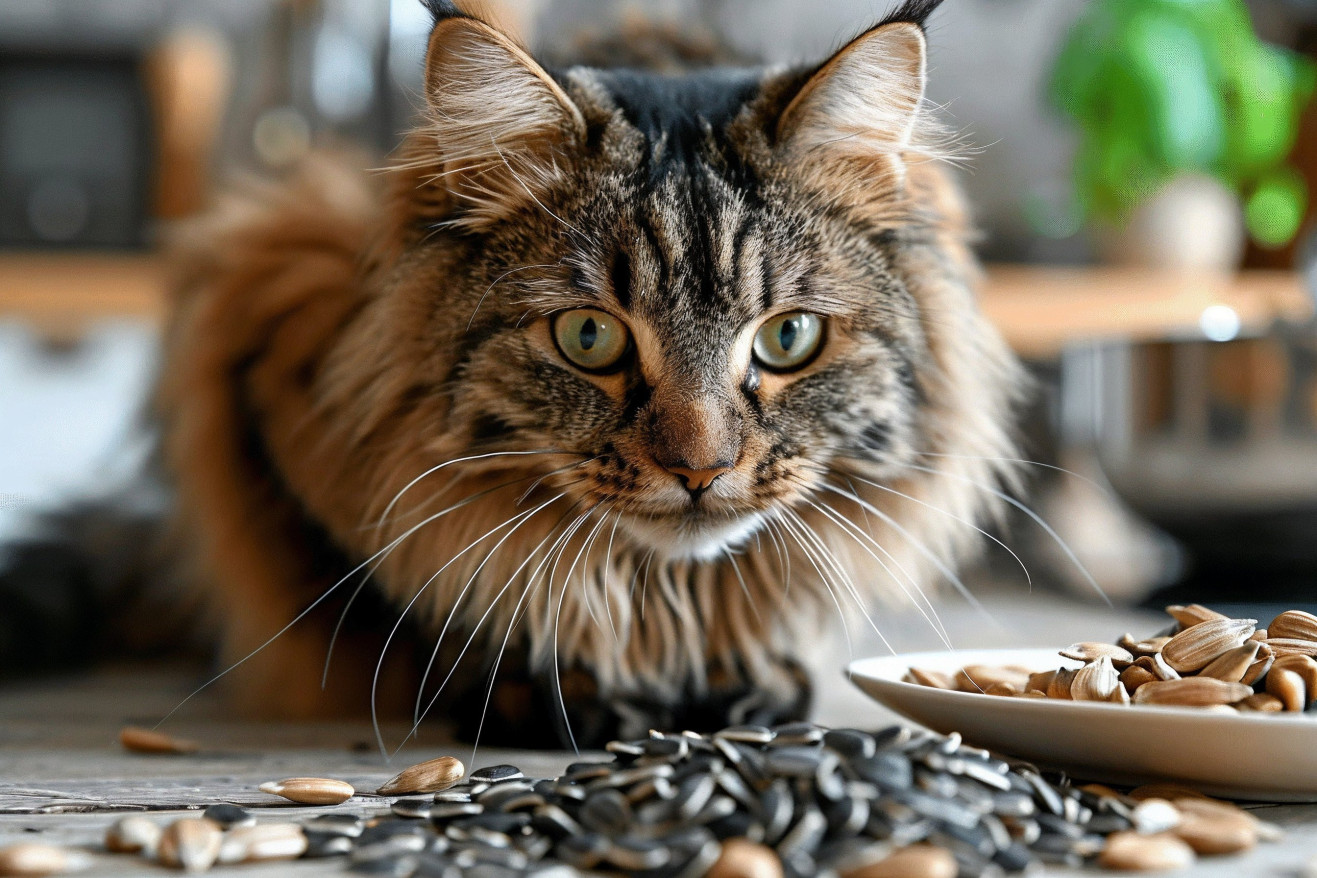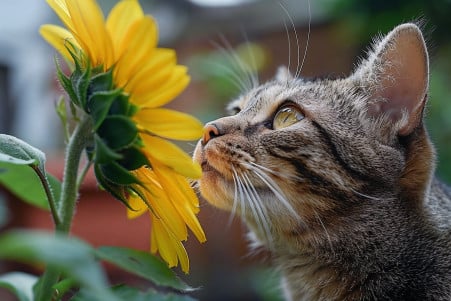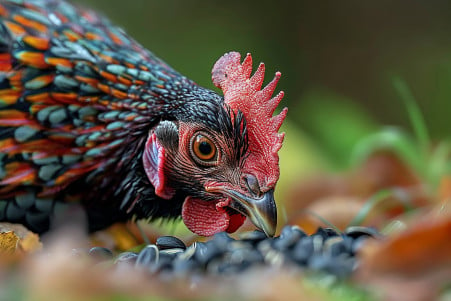Can Cats Eat Sunflower Seeds? A Look at Nutrition and Safety
26 March 2024 • Updated 25 March 2024

While sunflower seeds can be a nutritious addition to a cat's diet, there are some important things for pet parents to keep in mind. Cats can eat sunflower seeds in moderation and benefit from the protein, healthy fats, vitamin E, and other nutrients they contain. That said, sunflower seed shells can pose a choking risk and the seeds' high fat content can lead to gastrointestinal issues if cats eat too many. To be safe, remove the shells and offer just a few seeds at a time as an occasional treat.
As interest in non-traditional pet foods continues to rise, we'll review the latest findings from veterinary nutritionists, feline health organizations, and other animal care specialists to find out if sunflower seeds are safe and healthy for cats to eat. By doing so, we can offer evidence-based recommendations on portion control, potential dangers, and how sunflower seeds can be used to enhance a cat's overall diet.
Can cats eat sunflower seeds?
Nutritional Benefits of Sunflower Seeds for Cats
Sunflower seeds have several nutritional properties that can make them a healthy treat for cats in moderation. They are a good source of protein, according to Cuteness, which means they provide the essential amino acids cats need. They also contain vitamin E, an antioxidant that helps the immune system and skin.
In addition, sunflower seeds are a good source of fiber, which can help with digestion and hairball control in cats. Some nutrients like linoleic acid found in sunflower oil promote energy levels, heart health, and normal organ function in cats, according to pet nutritionists.
That said, it's important to remember that while sunflower seeds have some nutritional value, they should be used as a supplement to a balanced, meat-based cat food diet. Cats are obligate carnivores, which means they need nutrients like taurine that sunflower seeds do not provide in sufficient amounts. By feeding just a few shelled sunflower seeds at a time, cat parents can safely give their pets this nutritious treat as a supplement to a well-rounded cat food diet. In this way, the potential downsides can be managed and cats can still enjoy the health benefits of sunflower seeds.
Risks and Precautions of Feeding Sunflower Seeds to Cats
Although sunflower seeds can be a good source of certain nutrients for cats, there are also some risks and precautions to be aware of. The shells of sunflower seeds are hard and can be a choking hazard for cats and if swallowed, they can cause digestive obstructions or damage to the gastrointestinal tract, according to TheCatSite.
Feeding cats too many sunflower seeds can also result in gastrointestinal issues such as stomach upset, vomiting, or diarrhea due to the seeds’ high fat content, says Catster. In addition, cats can be allergic to sunflower seeds, and if they are, they may experience symptoms such as itching, skin problems, or gastrointestinal problems, according to the Cornell University College of Veterinary Medicine.
To avoid these issues, it’s important for pet parents to only feed their cats sunflower seeds that are unsalted and free of added oils or flavorings that could be toxic to cats. It’s also a good idea to talk to a vet before giving cats sunflower seeds or any other new food. If these precautions are taken and sunflower seeds are fed to cats in moderation, they can be a safe and healthy treat, but pet parents should be careful to avoid potential hazards to their feline friends.
Portion Control and Other Safety Considerations
Sunflower seeds should be given to cats in moderation and as a treat, not a regular part of their diet. Waldo's Friends recommends a portion size of a few shelled seeds, no more than once or twice a week. It's also important to introduce new foods gradually to watch for signs of allergies, as Petcube says that 10-15% of cats have food allergies.
It's important to make sure that the sunflower seeds are plain and not salted, sweetened, or flavored, as these additives can be harmful to cats. Basepaws also cautions against feeding cats wild or bird seed sunflower seeds that still have their shells, as the shells can be a choking hazard. However, as long as these precautions are taken and sunflower seeds are given in moderation, they can be a healthy treat to share with cats.
How to Spot and Treat Sunflower Seed Allergies in Cats
Cats are known to have food allergies, with an estimated 10-15% of the population being affected, according to VCA Animal Hospitals. Signs of a sunflower seed allergy can include itching, skin problems, gastrointestinal issues, or respiratory symptoms, which are similar to those of a peanut allergy according to Healthline.
Both elimination diet trials and allergy testing can be used to diagnose an allergy to sunflower seeds, according to the study in PMC. Treatment for a sunflower allergy requires a strict sunflower seed-free diet that also eliminates any cross-reactive foods. In some cases, veterinarians may recommend immunotherapy or antihistamines to help manage severe allergic reactions.
Cats with sunflower seed allergies can be successfully treated with a sunflower seed-free diet and other treatments as recommended by a veterinarian. This will allow them to continue to eat a nutritionally complete diet while avoiding the allergen. Pet owners can also continue to feed sunflower seeds to their cats as long as they understand the risks and work with their vet to ensure their cat's safety.
Conclusion: Sunflower Seeds Can Be Safe If Given in Moderation
While sunflower seeds can be a good source of protein, vitamins, minerals, and healthy fats for cats, it's important to remember that these benefits can only be realized if the seeds are given in moderation. Sunflower seeds are a good source of vitamin E, an antioxidant that can help support immune function and skin health, as well as fiber, which can help with digestion.
That said, cat owners need to be aware of the potential dangers of sunflower seeds. The shells can be a choking hazard and cause digestive blockages. In addition, the high fat content of sunflower seeds can lead to stomach upset if cats are given too many, and some cats may be allergic to sunflower seeds, which can cause symptoms like itching or gastrointestinal distress.
To ensure that sunflower seeds are safe for cats, cat owners should remove the shells and only give a few seeds at a time, no more than once or twice a week. It's also important to consult a veterinarian before introducing sunflower seeds to a cat's diet to make sure they are safe and appropriate for an individual cat. Sunflower seeds can be a good supplement to a cat's diet, but they should never be used to replace a balanced, meat-based cat food.


